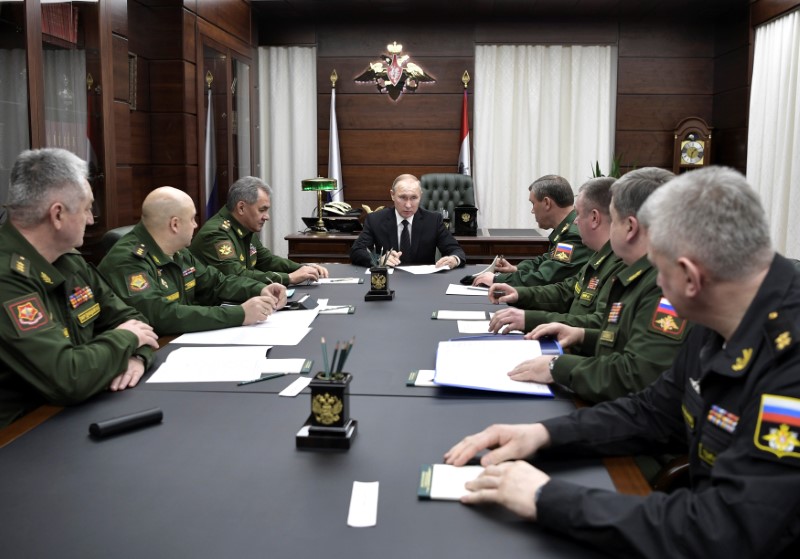
By Jonathan Landay
WASHINGTON (Reuters) – The risk of conflicts between and within nations will increase over the next five years to levels not seen since the Cold War as global growth slows, the post-World War Two order erodes and anti-globalization fuels nationalism, said a U.S. intelligence report released on Monday.
“These trends will converge at an unprecedented pace to make governing and cooperation harder and to change the nature of power – fundamentally altering the global landscape,” said “Global Trends: Paradox of Progress,” the sixth in a series of quadrennial studies by the U.S. National Intelligence Council.
The findings, published less than two weeks before U.S. President-elect Donald Trump takes office on Jan. 20, outlined factors shaping a “dark and difficult near future,” including a more assertive Russia and China, regional conflicts, terrorism, rising income inequality, climate change and sluggish economic growth.
Global Trends reports deliberately avoid analyzing U.S. policies or choices, but the latest study underscored the complex difficulties Trump must address in order to fulfill his vows to improve relations with Russia, level the economic playing field with China, return jobs to the United States and defeat terrorism.
The National Intelligence Council comprises the senior U.S. regional and subject-matter intelligence analysts. It oversees the drafting of National Intelligence Estimates, which often synthesize work by all 17 intelligence agencies and are the most comprehensive analytic products of U.S intelligence.
The study, which included interviews with academic experts as well as financial and political leaders worldwide, examined political, social, economic and technological trends that the authors project will shape the world from the present to 2035, and their potential impact.
‘INWARD-LOOKING WEST’
It said the threat of terrorism would grow in coming decades as small groups and individuals harnessed “new technologies, ideas and relationships.”
Uncertainty about the United States, coupled with an “inward-looking West” and the weakening of international human rights and conflict prevention standards, will encourage China and Russia to challenge American influence, the study added.
Those challenges “will stay below the threshold of hot war but bring profound risks of miscalculation,” the study warned. “Overconfidence that material strength can manage escalation will increase the risks of interstate conflict to levels not seen since the Cold War.”
While “hot war” may be avoided, differences in values and interests among states and drives for regional dominance “are leading to a spheres of influence world,” it said,
The latest Global Trends, the subject of a Washington conference, added that the situation also offered opportunities to governments, societies, groups and individuals to make choices that could bring “more hopeful, secure futures.”
“As the paradox of progress implies, the same trends generating near-term risks also can create opportunities for better outcomes over the long term,” the study said.
THE HOME FRONT
The report also said that while globalization and technological advances had “enriched the richest” and raised billions from poverty, they had also “hollowed out” Western middle classes and ignited backlashes against globalization. Those trends have been compounded by the largest migrant flows in seven decades, which are stoking “nativist, anti-elite impulses.”
“Slow growth plus technology-induced disruptions in job markets will threaten poverty reduction and drive tensions within countries in the years to come, fueling the very nationalism that contributes to tension between counties,” it said.
The trends shaping the future include contractions in the working-age populations of wealthy countries and expansions in the same group in poorer nations, especially in Africa and South Asia, increasing economic, employment, urbanization and welfare pressures, the study said.
The world will also continue to experience weak near-term growth as governments, institutions and businesses struggle to overcome fallout from the Great Recession, the study said.
“Major economies will confront shrinking workforces and diminishing productivity gains while recovering from the 2008-09 financial crisis with high debt, weak demand, and doubts about globalization,” said the study.
“China will attempt to shift to a consumer-driven economy from its longstanding export and investment focus. Lower growth will threaten poverty reduction in developing counties.”
Governance will become more difficult as issues, including global climate change, environmental degradation and health threats demand collective action, the study added, while such cooperation becomes harder.
(Reporting by Jonathan Landay; Editing by John Walcott and Peter Cooney)









